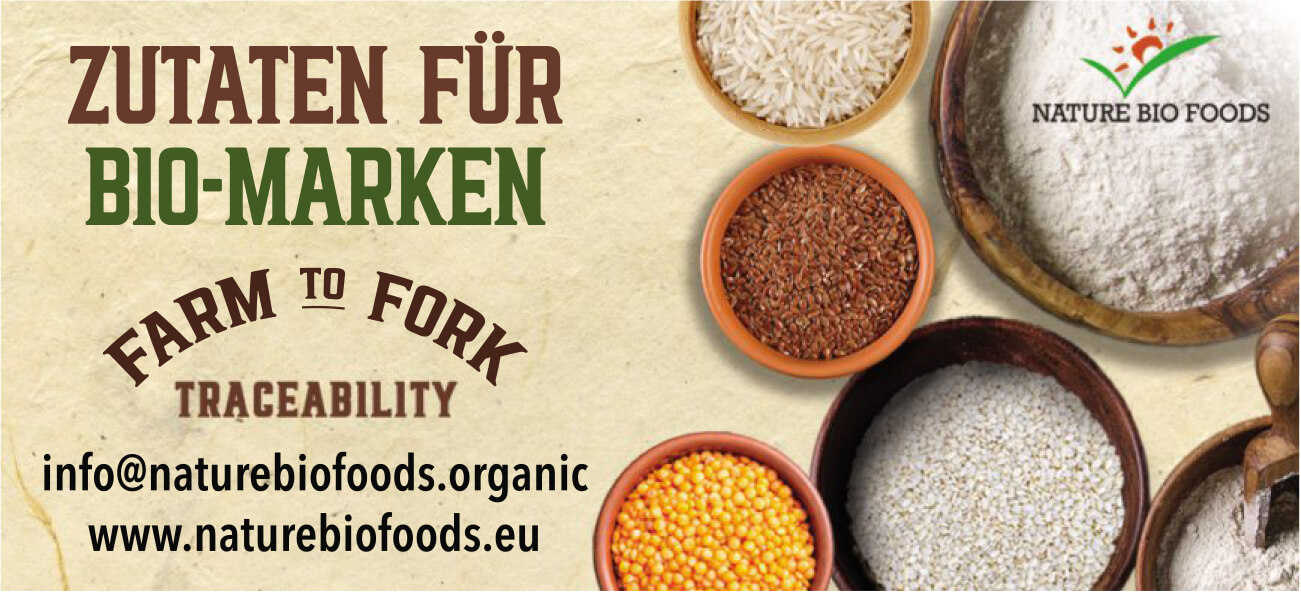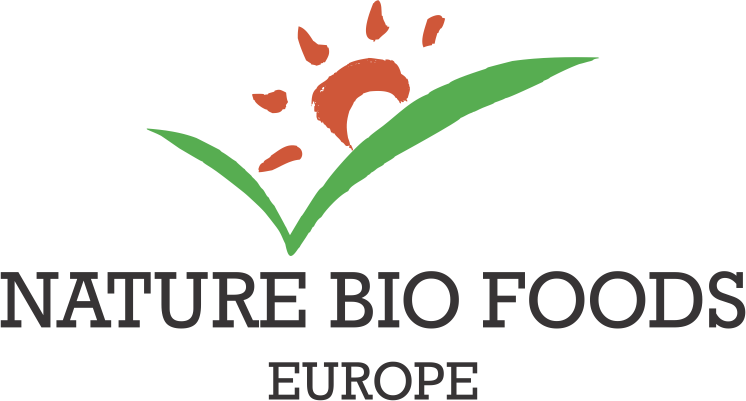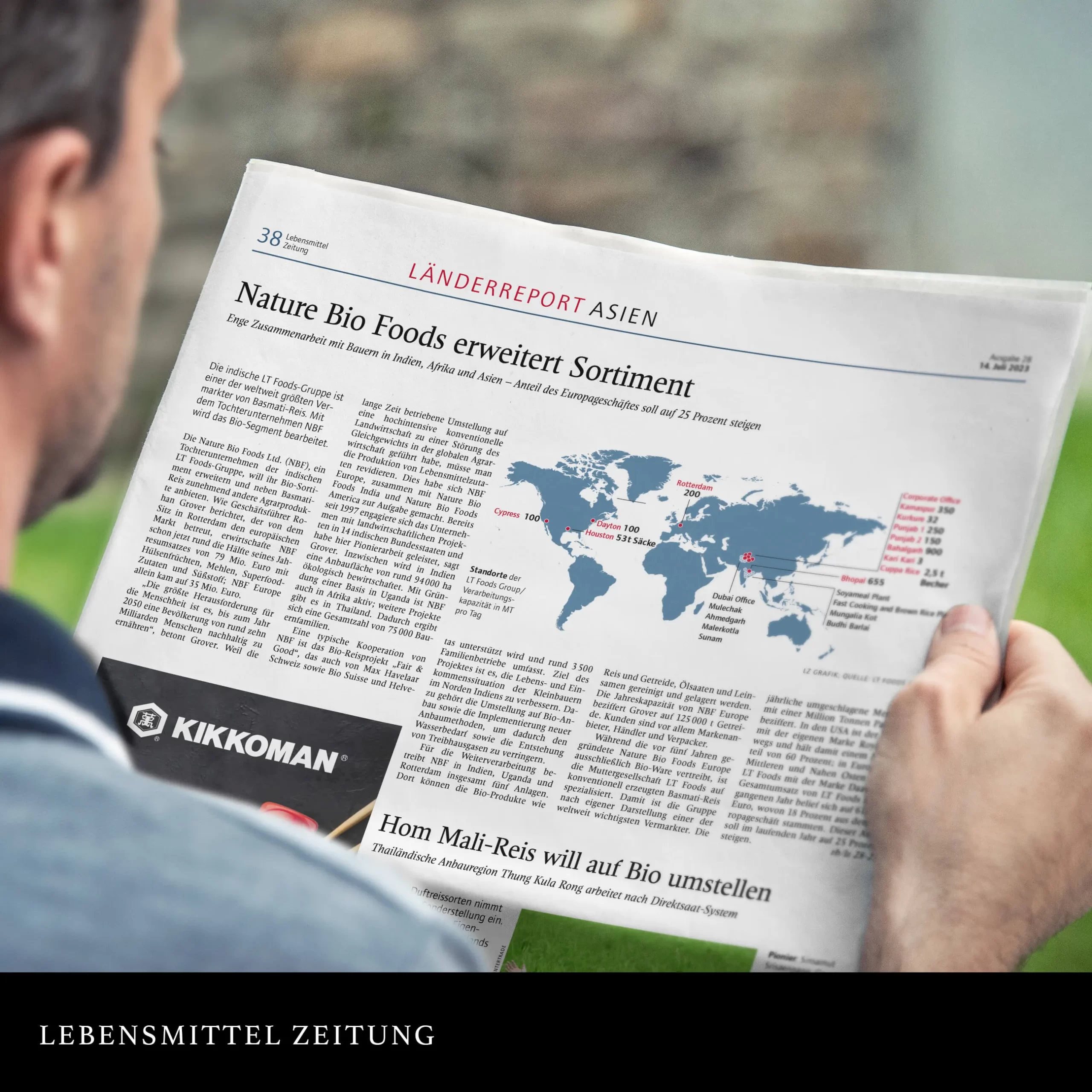Close collaboration with farmers in India, Africa and Asia – share of European business to increase to 25 percent
The Indian LT Foods Group is one of the world’s largest marketers of Basmati rice. With the subsidiary NBF the organic segment is being worked on.
Nature Bio Foods Ltd. (NBF), a subsidiary of the Indian LT Foods Group, wants to expand its organic range and offer agricultural products in addition to Basmati rice. As Managing Director Ro- han Grover reports, who looks after the European market from the Rotterdam office, NBF already generates about half of its annual turnover of 79 million euros with legumes, flours, superfood ingredients and sweeteners; NBF Europe alone accounted for 35 million euros.

“The greatest challenge for humanity is to sustainably feed a population of around ten billion people by the year 2050,” emphasizes Grover. Because the long-term conversion to highly intensive conventional agriculture has led to a disruption of the balance in the global agricultural economy, the production of food ingredients must be revised. This is what NBF Europe, together with Nature Bio Foods India and Nature Bio Foods America have set out to do. The company has been involved in agricultural projects in 14 Indian states since 1997 and has done pioneering work here, says Grover. Meanwhile, an area of about 94,000 ha is being farmed organically in India. With the establishment of a base in Uganda, NBF is also active in Africa; there are further projects in Thailand. This results in a total of 75,000 farmer families.
A typical cooperation of NBF is the organic rice project “Fair & Good”, which is also supported by Max Havelaar Switzerland as well as Bio Suisse and Helve- tas and comprises about 3,500 family businesses. The aim of the project is to improve the living and income situation of small farmers in northern India. This includes the conversion to organic farming and the implementation of new farming methods to reduce the water requirement and the production of greenhouse gases.
For further processing, NBF operates a total of five plants in India, Uganda and Rotterdam. There, organic products such as rice and grains, oilseeds and flax seeds can be cleaned and stored. The annual capacity of NBF Europe is estimated by Grover at 125,000 tons of grain. Customers are mainly brand providers, traders and packers.
While the Nature Bio Foods Europe founded five years ago exclusively distributes organic goods, the parent company LT Foods specializes in conventionally produced Basmati rice. This makes the group one of the world’s most important marketers, according to its own statements. The annual turnover is estimated at one million tons of paddy rice. In the USA, the group operates with its own brand Royal and thus holds a market share of 60 percent; in Europe, the Middle and Near East, LT Foods works with the Daavat brand. The total turnover of LT Foods last year amounted to 618 million euros, of which 18 percent came from the European business. This share is expected to increase to 25 percent this year.
Enge Zusammenarbeit mit Bauern in Indien, Afrika und Asien – Anteil des Europageschäftes soll auf 25 Prozent steigen
Die indische LT Foods-Gruppe ist einer der weltweit größten Vermarkter von Basmati-Reis. Mit dem Tochterunternehmen NBF wird das Bio-Segment bearbeitet.
Die Nature Bio Foods Ltd. (NBF), ein Tochterunternehmen der indischen LT Foods-Gruppe, will ihr Bio-Sortiment erweitern und neben Basmati- Reis zunehmend andere Agrarprodukte anbieten. Wie Geschäftsführer Rohan Grover berichtet, der von dem Sitz in Rotterdam den europäischen Markt betreut, erwirtschafte NBF schon jetzt rund die Hälfte seines Jahresumsatzes von 79 Mio. Euro mit Hülsenfrüchten, Mehlen, Superfood- Zutaten und Süßstoff; NBF Europe allein kam auf 35 Mio. Euro.
 „Die größte Herausforderung für die Menschheit ist es, bis zum Jahr 2050 eine Bevölkerung von rund zehn Milliarden Menschen nachhaltig zu ernähren“, betont Grover. Weil die lange Zeit betriebene Umstellung auf eine hochintensive konventionelle Landwirtschaft zu einer Störung des Gleichgewichts in der globalen Agrarwirtschaft geführt habe, müsse man die Produktion von Lebensmittelzutaten revidieren. Dies habe sich NBF Europe, zusammen mit Nature Bio Foods India und Nature Bio Foods America zur Aufgabe gemacht. Bereits seit 1997 engagiere sich das Unternehmen mit landwirtschaftlichen Projekten in 14 indischen Bundesstaaten und habe hier Pionierarbeit geleistet, sagt Grover. Inzwischen wird in Indien eine Anbaufläche von rund 94 000 ha ökologisch bewirtschaftet. Mit Gründung einer Basis in Uganda ist NBF auch in Afrika aktiv; weitere Projekte gibt es in Thailand. Dadurch ergibt sich eine Gesamtzahl von 75 000 Bauernfamilien.
„Die größte Herausforderung für die Menschheit ist es, bis zum Jahr 2050 eine Bevölkerung von rund zehn Milliarden Menschen nachhaltig zu ernähren“, betont Grover. Weil die lange Zeit betriebene Umstellung auf eine hochintensive konventionelle Landwirtschaft zu einer Störung des Gleichgewichts in der globalen Agrarwirtschaft geführt habe, müsse man die Produktion von Lebensmittelzutaten revidieren. Dies habe sich NBF Europe, zusammen mit Nature Bio Foods India und Nature Bio Foods America zur Aufgabe gemacht. Bereits seit 1997 engagiere sich das Unternehmen mit landwirtschaftlichen Projekten in 14 indischen Bundesstaaten und habe hier Pionierarbeit geleistet, sagt Grover. Inzwischen wird in Indien eine Anbaufläche von rund 94 000 ha ökologisch bewirtschaftet. Mit Gründung einer Basis in Uganda ist NBF auch in Afrika aktiv; weitere Projekte gibt es in Thailand. Dadurch ergibt sich eine Gesamtzahl von 75 000 Bauernfamilien.
Eine typische Kooperation von NBF ist das Bio-Reisprojekt „Fair & Good“, das auch von Max Havelaar Schweiz sowie Bio Suisse und Helvetas unterstützt wird und rund 3 500 Familienbetriebe umfasst. Ziel des Projektes ist es, die Lebens- und Einkommenssituation der Kleinbauern im Norden Indiens zu verbessern. Dazu gehört die Umstellung auf Bio-Anbau sowie die Implementierung neuer Anbaumethoden, um dadurch den Wasserbedarf sowie die Entstehung von Treibhausgasen zu verringern.
Für die Weiterverarbeitung betreibt NBF in Indien, Uganda und Rotterdam insgesamt fünf Anlagen. Dort können die Bio-Produkte wie Reis und Getreide, Ölsaaten und Leinsamen gereinigt und gelagert werden. Die Jahreskapazität von NBF Europe beziffert Grover auf 125 000 t Getreide. Kunden sind vor allem Markenanbieter, Händler und Verpacker.
Während die vor fünf Jahren gegründete Nature Bio Foods Europe ausschließlich Bio-Ware vertreibt, ist die Muttergesellschaft LT Foods auf konventionell erzeugten Basmati-Reis spezialisiert. Damit ist die Gruppe nach eigener Darstellung einer der weltweit wichtigsten Vermarkter. Die jährliche umgeschlagene Menge wird mit einer Million Tonnen Paddy-Reis beziffert. In den USA ist der Konzern mit der eigenen Marke Royal unterwegs und hält damit einem Marktanteil von 60 Prozent; in Europa, dem Mittleren und Nahen Osten arbeitet LT Foods mit der Marke Daavat. Der Gesamtumsatz von LT Foods im vergangenen Jahr belief sich auf 618 Mio. Euro, wovon 18 Prozent aus dem Europageschäft stammten. Dieser Anteil soll im laufenden Jahr auf 25 Prozent steigen.
rb/lz 28-23



